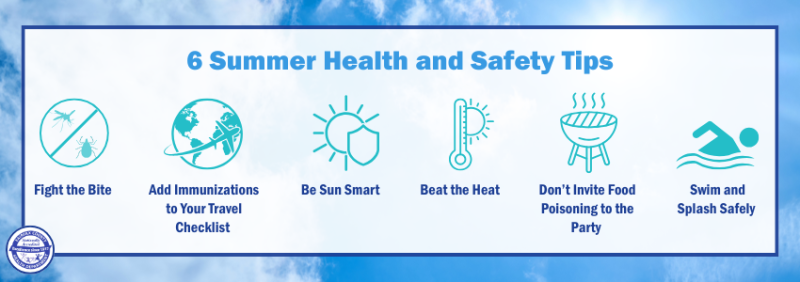
School is out, days are warm, and summer is here. Make the most of it with these six reminders for a healthy and safe summer.
Fight the Bite
Mosquitoes and ticks can ruin outdoor fun. Their bites are more than annoying — sometimes they transmit diseases. West Nile virus and Lyme disease are two of the vector-borne diseases transmitted by mosquitoes and ticks, respectively, in our region. Get in the habit of taking these simple prevention measures when you go outside:
- Use insect repellents that contain EPA-registered active ingredients like DEET or picaridin.
- Wear long, loose, light-colored clothing when outdoors.
- Shower soon after outdoor activities; perform tick checks (on yourself, family members, and pets) after spending time outside.
Find more ways to fight the bite, including how to control mosquitoes and ticks.
Add Immunizations to Your Travel Checklist
International travel increases your chances of getting and spreading diseases that are rare or not found in the United States. If your summer plans including traveling outside the country, check to see what immunizations are recommended for the area you are visiting. Prior to traveling, you should also make sure you are up to date on all of your routine vaccines.
See what immunizations you need before traveling and where to get them.
Don’t Invite Food Poisoning to the Party
Food poisoning peaks in the summer months when warmer temperatures cause foodborne germs to flourish. From burgers at barbeques to potato salad at potlucks, there are steps you can take to prevent foodborne illness, such as cooking food to the correct temperature and storing it properly. Get more food safety tips.
Beat the Heat
Extreme heat is a period of high heat and humidity with temperatures above 90 degrees for multiple days. Extreme heat can be dangerous for everyone, but can be especially dangerous for older adults, infants and young children, and people with chronic medical conditions.
- Learn to recognize warning signs and symptoms of heat-related illness, such as heat stroke and heat exhaustion.
- Stay cool and stay hydrated.
- Stay informed by paying attention to local weather. You can also follow us on social media and sign up for alerts from Fairfax County.
Be Sun Smart
Enjoy the outdoors without raising your risk of skin cancer by protecting your skin from the sun. UV rays damage the skin which leads to wrinkles and increases your risk of skin cancer. Remember, you can be exposed to ultraviolet (UV) light even on cloudy and cool days. Layer up on your protection to be sun safe.
- Choose a broad-spectrum sunscreen that filters out both UVA and UVB rays with an SPF of 30 or higher and reapply regularly.
- Wear protective layers like a wide-brimmed hat, sunglasses that block UVA and UVB rays, and protective clothing.
- Whenever possible, find shade and avoid being in the sun when UV rays tend to be strongest — between 10 a.m. and 4 p.m. daylight saving time.
Swim and Splash Safely
Swimming, and other water-based activities, are a great way to be active while staying cool. Everyone should take steps to prevent illness and injury every time they are in and around the water.
Recreational water illnesses are caused by swallowing, breathing in mist, and having contact with contaminated water. Healthy swimming habits, like not swallowing water, can lower your chance of getting sick. It is also important to stay out of the water if you are sick with diarrhea, to rinse off before getting into pools, splash pads, and hot tubs, and to take young children on bathroom breaks and check diapers (away from the water) every hour.
Drowning often occurs quickly and silently. Follow these drowning prevention tips to keep you and your family safe while swimming:
- Provide active supervision when children are in the water
- Learn basic swimming skills
- Learn CPR
- Avoid swimming after dark
- Watch for swimming hazards like rip currents and rough waters
- Observe any advisories and listen to lifeguards
- “Floaties,” arm bands, and water wings are toys, not safety devices
- Ensure pools have proper safety features
It is also important to know what drowning looks like and how to prevent it.

